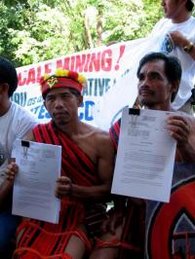First posted 05:38am (Mla time) June 24, 2006
By Blanche Rivera
Inquirer
http://news.inq7.net/archive_article/index.php?ver=1&index=1&story_id=6393
Editor's Note: Published on page A10 of the June 24, 2006 issue of the Philippine Daily Inquirer
THE government has foregone collecting $63.88 million or P3.57 billion in taxes from Lafayette Philippines Inc. for mining gold and base metals in Albay because of the tax perks given to the Australian firm by the Philippine Economic Zone Authority (Peza).
A report prepared by the Department of Environment and Natural Resources on Lafayette’s operations in Rapu-Rapu, a 5,000-ha island in Albay, showed that the national and local governments could earn $122.69 million or P6.8 billion over six years if no tax incentives had been offered to the firm.
Instead, the government stands to gain only $58.81 million or P3.29 billion during Lafayette’s six-year mine life because of the tax perks enjoyed by Lafayette’s subsidiary Rapu-Rapu Processing Inc. as a locator in a special economic zone.
Peza had declared 41.38 hectares of the 180-ha mine area of Lafayette a special economic zone, exempting the company from paying real estate and other taxes, and requiring it to pay only five percent of the mandated 35 percent corporate income tax.
Environment Secretary Angelo T. Reyes has asked Peza to review the economic zone status of a portion of Rapu-Rapu.The 70-page report that found Lafayette guilty of lapses that caused two mine spills also noted that the tax incentives granted to Lafayette made the sharing scheme “grossly unfavorable to the Philippine government.” The current scheme stands at 24-74 in favor of Lafayette.
Reyes said he would push for 54-46, or the scheme representing a tax perk-free arrangement with Lafayette in favor of the government.Lafayette Mining Ltd. said yesterday it paid a fine of P10.4 million ($195,490) imposed by the government after the two cyanide spills in its mine in October last year.
The company also said it expected to fully comply this week with 15 conditions set by the government before it can start a 30-day test run at its mine on Rapu-Rapu, which was ordered to halt operations after the spills.“We’re definitely hoping that for our own benefit we will be able to start the test run soon,” said Bayani Agabin, a lawyer and vice president at Lafayette’s Philippine unit.
Reyes has said the test run, if successful, will lead to the full reopening of the mine.
The government is pushing a revival of the mining sector to attract foreign investment and reduce poverty but has come under pressure from influential Roman Catholic bishops voicing concerns about the environmental impact.
Lafayette, the first foreign firm to develop and run a mine in the Philippines in almost 40 years, estimates Rapu-Rapu will generate revenues of $350 million per year from annual production of 10,000 tons of copper in concentrates, 14,000 tons of zinc, 50,000 ounces of gold and 600,000 ounces of silver.
A fact-finding committee investigating the spills in October, chaired by Sorsogon Bishop Arturo Bastes, called for the permanent closure of Lafayette’s operations, a moratorium on mining on Rapu-Rapu and a review of the law allowing 100-percent foreign ownership of local mines.
The test run at the Rapu-Rapu mine will involve three stages—a five-day run of the processing plant with water to detect pipe leaks; a nine-day run with ore but without the minerals; and a 15-day run with ore and metals.
Some estimates value the Philippines’ mineral wealth at $1 trillion. But many foreign investors have been discouraged by political turmoil, corruption, insurgencies in the resource-rich south and opposition from bishops and indigenous groups. With an Inquirer wire report
Saturday, June 24, 2006
Subscribe to:
Post Comments (Atom)

No comments:
Post a Comment